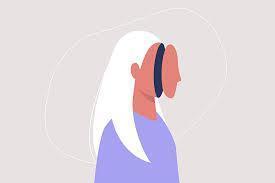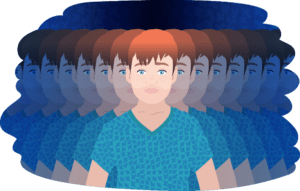There are two major types of dissociation, which are often mistakenly used interchangeably. Dissociation is the act of disconnecting from one’s thoughts or feelings, while disassociation is the act of separating oneself from an event. This post will help you understand this difference and why it matters in your daily life, as well as how to cope with either type on a personal level.
Contents
What is Dissociation?

Dissociation is the act of disconnecting from one’s thoughts or feelings. It can be a way to cope with overwhelming emotions or situations that are too difficult to process. When you dissociate, you may feel like your mind and body are no longer connected. You may experience a sense of detachment from yourself and the world around you. This can be a helpful coping mechanism in the short term, but it can also lead to problems if it becomes a habit.
Causes Of Dissociation
There are a number of factors that may contribute to dissociation, including:
- Physical or sexual abuse in childhood. Traumatic experiences later in life can also lead to this issue. Dissociation is more common among individuals who have a history of trauma. This means that people use it as an escape from difficult thoughts.
- Depression, anxiety, and other mental health issues. When you’re feeling overwhelmed or stressed, dissociation can be a way to cope with these feelings.
- Drug and alcohol abuse. Substance abuse can be a coping mechanism for dealing with difficult emotions and memories. It can also lead to dissociation as a side effect.
Symptoms Of Dissociation

Dissociation can be difficult to recognize because it’s different for everyone. However, there are some signs that you might use this coping mechanism on a regular basis. These include:
- Depersonalization: This is the sense of being detached from one’s self or reality. It often occurs when someone has been through a traumatic experience.
- Derealization: This is the sense that things aren’t real or you can’t trust your perceptions of reality. It often occurs after someone has experienced trauma, such as in cases of PTSD.
Changes to memory and concentration abilities are another sign that dissociation may be affecting your life on an ongoing basis. Some people also experience emotional numbing, which is when they feel less emotion than most people would in their situation.
Effects Of Dissociation
- Dissociation can have some short-term benefits that make it seem like a useful coping mechanism. However, this mental state may affect your ability to function on the job or at home over time. Some of the long-term effects of dissociation include:
- Problems with relationships. This is because dissociation can lead to a lack of trust and intimacy in personal relationships.
- Poor academic or job performance. Dissociation can interfere with your ability to focus and learn, as well as affect your motivation levels.
- Self-harm or suicidal thoughts or behaviors. This is because dissociation can often be accompanied by feelings of emptiness or numbness.
Therapies For Dissociation

There are several options that can be helpful in treating dissociation. These include:
- Psychotherapy is one of the most effective ways to treat this issue, as well as other mental health concerns. This involves talking with a therapist about your difficulties and learning healthier coping skills.
- Medication may also help manage some symptoms, especially when they’re related to a mental health condition.
- One way to help your body and mind is by taking care of these things. You can take a bath or go for a walk, or just stay at home. This will help you feel better. This includes things like exercise, meditation, healthy eating habits, hobbies that give you pleasure, or time spent with friends who make you feel good about yourself.
Helping Someone With Dissociation
If someone you care about is dissociating, it can be difficult to know what to do. However, there are a few things that you should keep in mind when helping this person:
- Reassure them that they’re safe and try not to let their behavior scare you. This could cause additional stress for both of you.
- Remind them of their surroundings and try to get them to talk about what’s going on. This can help to ground them in reality.
- Be patient and understanding. Remember that dissociation is a coping mechanism for this person, so they may not be able to control it.
If you are caring for someone who is dissociating, it’s important to remember that they need your support. Try to be patient and understanding, and reassure them that they are safe. If someone is doing something that makes you feel bad or scared, talk to someone who knows about this.
What is Disassociation?

Disassociation is the act of separating oneself from an event. It’s often used as a way to cope with trauma or stress. When you disassociate, you may feel like you’re watching yourself from the outside. You may feel like everything is happening to someone else and that you’re not really there. It’s important to note, however, that disassociation isn’t always a coping mechanism; sometimes it can be an indicator of PTSD or another mental health issue.
Causes Of Disassociation
Disassociation can be used as a way to cope with difficult events or memories. It can also occur when someone has an experience that triggers feelings of dissociation, such as drug use. Other possible causes include:
- History of childhood trauma is often associated with disassociation in adults. This may stem from abuse experienced during the formative years.
- History of substance abuse. Alcohol and drugs can cause disassociation as a side effect, which is why some people who have been through trauma may turn to drugs or alcohol as a way to cope with their difficult memories.
Symptoms Of Disassociation

Disassociation isn’t always easy to recognize because many people do it on a regular basis. However, there are some signs that you may have disassociated in a given situation:
- Feeling numb or disconnected from your surroundings is one possible sign of disassociation. This could be because something reminds you of a traumatic event or triggers feelings of dissociation. You might also feel like things aren’t real and it’s happening to someone else.
- Having a hard time concentrating or focusing is another sign that you may have disassociated in a given situation. This could be because everything feels foggy or unreal to you.
- Feeling like you’re watching yourself from the outside is also common among people who dissociate. You might feel like you’re in a dream-like state or that you’re not really there.
If you are experiencing any of these symptoms, it’s important to reach out for help. Dissociation can be a sign of a mental health issue, such as PTSD or addiction, and should be addressed by a professional.
Effects Of Disassociation
Disassociation can have some short-term benefits that make it seem like a useful coping mechanism. However, this mental state may affect your ability to function on the job or at home over time. Some of the long-term effects of disassociation include:
- Problems with relationships. This is because dissociation can lead to a lack of trust and intimacy in personal relationships.
- Poor academic or job performance. Dissociation can interfere with your ability to focus and learn, as well as affect your motivation levels.
- Self-harm or suicidal thoughts or behaviors. This is because dissociation can often be accompanied by feelings of emptiness or numbness.
Therapies For Disassociation

If you are experiencing disassociation, there are therapies that can help. Some of these include:
- Cognitive-behavioral therapy (CBT). This type of therapy helps you to change the way you think about and cope with difficult situations.
- Dialectical behavior therapy (DBT). This type of therapy helps you to learn how to regulate your emotions and tolerate distress.
- Eye movement desensitization and reprocessing (EMDR). This therapy helps you to process traumatic memories in a safe and controlled environment.
If you are experiencing disassociation, it’s important to reach out for help. There are therapies that can help you manage your symptoms and live a healthier life.
Helping Someone With Disassociation
If you know someone who is dealing with disassociation, there are a few things you can do to help them out.
- First and foremost, be supportive and understanding. Listen to them, and let them talk about what they’re feeling. Don’t force them to talk. But if they want to, be there for them.
- If they want you to help them, be supportive. Don’t push your friend to do something they don’t want to do. Ask them how often you can check in with them and respect their answer.
Above all, remember that disassociation is a coping mechanism – it’s not who your friend is as a person. They are the same person as before, but they live in a difficult situation and need to find ways to survive. Thank them for being strong, and let them know that you support them.
Difference Between Dissociation And Disassociation
The main difference between dissociation and disassociation is that one is used as a coping mechanism, while the other can be a sign of a mental health issue. To disassociate means to separate yourself from an event or memory. To dissociate means that you are disconnected from your physical surroundings. PTSD or addiction could mean that you have a mental health issue. You should tell your healthcare provider if you notice any warning signs. They’ll be able to help you with the right treatment options for your needs.
Which One Should I Use Out Of Dissociation And Disassociation?
It depends on the situation. If you are using a coping mechanism called disassociation, then it’s important to be mindful of how often you use it. It is also important to think about whether or not it affects your daily life. If you are having a hard time because of a mental health problem like PTSD or addiction, then you need to ask for help. There is not one size for mental health conditions. There are many treatments that can help you feel better.
Conclusion
Dissociation and disassociation are ways to think about how people with certain mental illnesses think. This has led to a common idea about what it means to have DID. But people don’t know much about it, so they are wrong. Some people who have DID will feel like they are not in their world. They can still do things but might feel like they are not there. This is normal. They learned to live in two worlds at once and it does not matter if someone feels this way. People with DID have a hard time being around other people. They need time by themselves so they don’t feel so bad. They have to live with many different personalities. This is a problem that people cannot control, but they can help someone find ways to do it. If you know someone who has DID and wants your help, then give them the time they need by themselves first before talking about it.
If you are looking for affordable Online Counseling MantraCare can help: Book a trial therapy session


